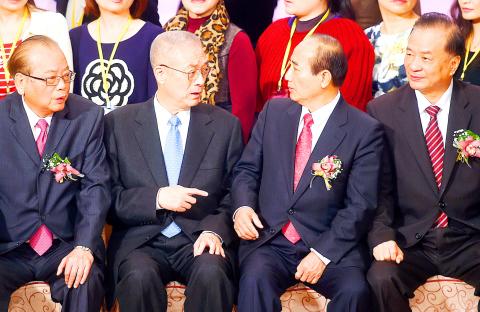The legal case concerning Legislative Speaker Wang Jin-pyng’s (王金平) party membership, which some expected to top the agenda at the Chinese Nationalist Party’s (KMT) Central Standing Committee (CSC) meeting yesterday, was not dealt with, although Vice President Wu Den-yih (吳敦義), who is acting KMT chairman, did say dropping the lawsuit might discredit the party’s Central Evaluation and Discipline Committee.
Wang took the KMT to court in September last year after the committee revoked his membership amid allegations Wang tried to influence justice officials to help an opposition legislator in a legal case.
The Taiwan High Court in September ruled in Wang’s favor, upholding a district court decision in May ruling that Wang still holds his KMT membership. The party filed an appeal.

Photo: Chen I-chuan, Taipei Times
The meeting yesterday was the first after the party’s defeat in the nine-in-one elections on Nov. 29. Many party members, KMT legislators included, had expected Wu, as the acting chairperson, to announce a retraction of the lawsuit against Wang to demonstrate party solidarity.
More than 20 CSC members said at the meeting that the party should drop the case, but Wu decided to hold off on reviewing the proposal.
Earlier yesterday, Wu said he had told Wang that his case would not be discussed at the meeting since “a lot has to be taken into account.”
“The High Court’s ruling has cast doubt on the established authority of the discipline committee, so dropping the lawsuit would be tantamount to endorsing the doubt,” Wu said. “If it did drop the case, how is the KMT to handle violations of party disciplines in the future?”
“We have asked divisions to review the matter, evaluating the effect of a possible retraction and whether it would affect the credibility of the discipline committee,” he added. “The opinions offered by the experts are to be collected for the new party chairperson’s consideration.”
“It would not be appropriate for an acting chairperson to make such a big decision,” Wu said.
Wu said that during his term as acting chairman, which is to last about a month, three major issues need to be settled: a review of the party’s performance in the elections; a public and fair party chairperson by-election; and a discussion about and nominations for council speaker and legislators.
Separately, Wu reiterated that he would not run for the chairmanship and, when asked about the rumor that he would run for president in 2016 with Wang being party chairman, Wu said he had “never heard such reports,” a response echoed by Wang.
Wang also denied that he would join the race for the chairperson role, saying that he had not thought about it.
Wu and Wang said they were open to any candidate for party chairperson after reporters said many have been urging New Taipei City Mayor Eric Chu (朱立倫) to stand.
The KMT set Jan. 17 as the date for the chairperson election.
Additional reporting by Shih Hsiu-chuan

NATIONAL SECURITY THREAT: An official said that Guan Guan’s comments had gone beyond the threshold of free speech, as she advocated for the destruction of the ROC China-born media influencer Guan Guan’s (關關) residency permit has been revoked for repeatedly posting pro-China content that threatens national security, the National Immigration Agency said yesterday. Guan Guan has said many controversial things in her videos posted to Douyin (抖音), including “the red flag will soon be painted all over Taiwan” and “Taiwan is an inseparable part of China,” while expressing hope for expedited “reunification.” The agency received multiple reports alleging that Guan Guan had advocated for armed reunification last year. After investigating, the agency last month issued a notice requiring her to appear and account for her actions. Guan Guan appeared as required,

Japan and the Philippines yesterday signed a defense pact that would allow the tax-free provision of ammunition, fuel, food and other necessities when their forces stage joint training to boost deterrence against China’s growing aggression in the region and to bolster their preparation for natural disasters. Japan has faced increasing political, trade and security tensions with China, which was angered by Japanese Prime Minister Sanae Takaichi’s remark that a Chinese attack on Taiwan would be a survival-threatening situation for Japan, triggering a military response. Japan and the Philippines have also had separate territorial conflicts with Beijing in the East and South China

A strong cold air mass is expected to arrive tonight, bringing a change in weather and a drop in temperature, the Central Weather Administration (CWA) said. The coldest time would be early on Thursday morning, with temperatures in some areas dipping as low as 8°C, it said. Daytime highs yesterday were 22°C to 24°C in northern and eastern Taiwan, and about 25°C to 28°C in the central and southern regions, it said. However, nighttime lows would dip to about 15°C to 16°C in central and northern Taiwan as well as the northeast, and 17°C to 19°C elsewhere, it said. Tropical Storm Nokaen, currently

PAPERS, PLEASE: The gang exploited the high value of the passports, selling them at inflated prices to Chinese buyers, who would treat them as ‘invisibility cloaks’ The Yilan District Court has handed four members of a syndicate prison terms ranging from one year and two months to two years and two months for their involvement in a scheme to purchase Taiwanese passports and resell them abroad at a massive markup. A Chinese human smuggling syndicate purchased Taiwanese passports through local criminal networks, exploiting the passports’ visa-free travel privileges to turn a profit of more than 20 times the original price, the court said. Such criminal organizations enable people to impersonate Taiwanese when entering and exiting Taiwan and other countries, undermining social order and the credibility of the nation’s